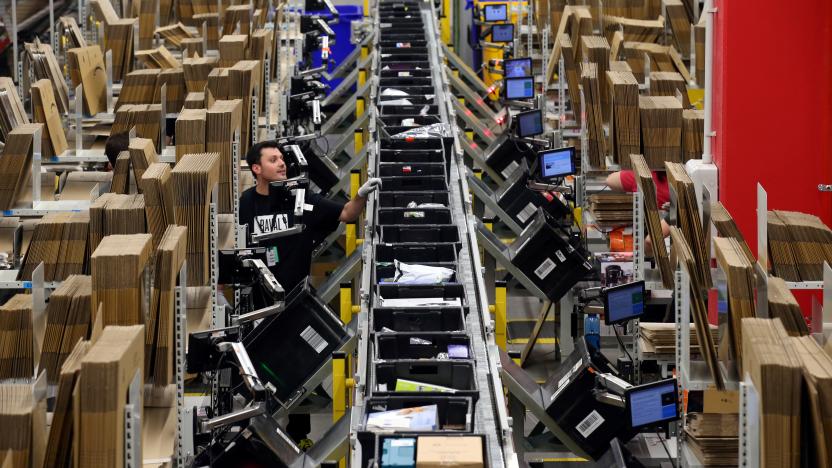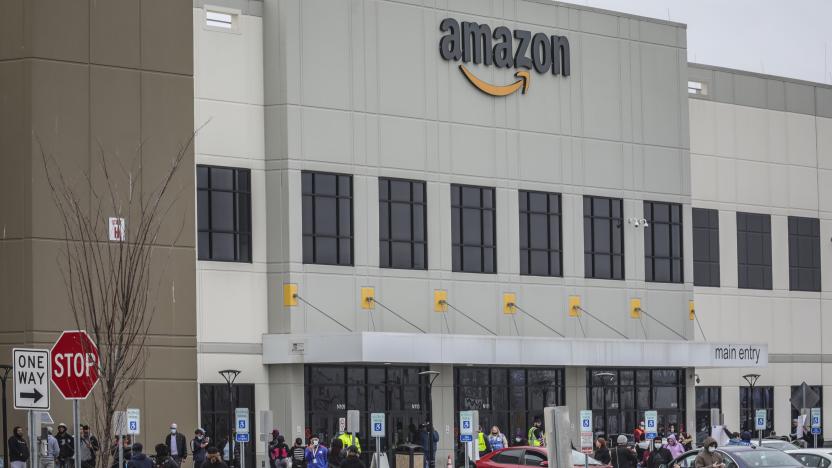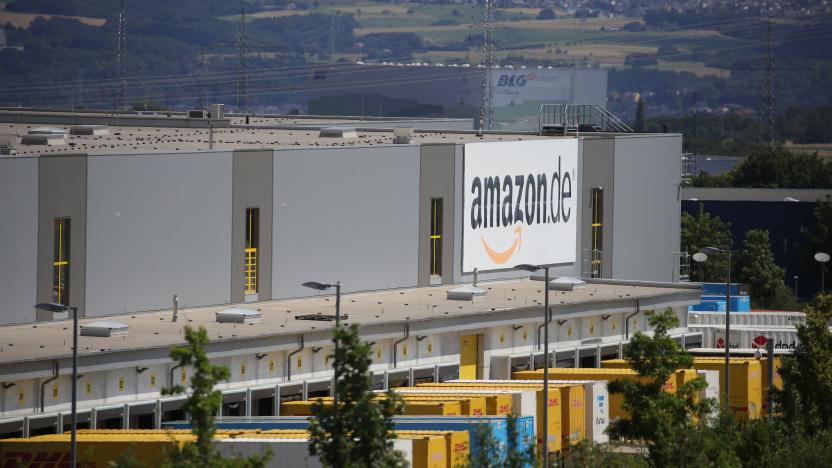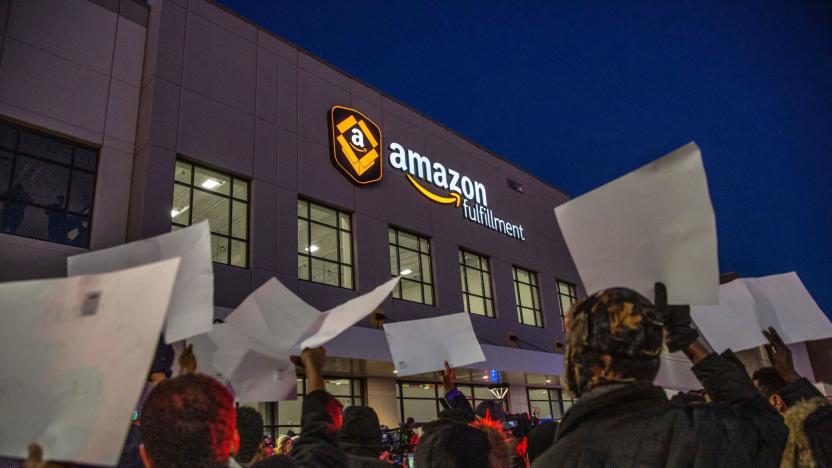working conditions
Latest

Amazon will give its US frontline workers a $300 holiday bonus
The company will give full-time US employees who work December 1st through to December 31st an extra $300 at the end of the year.

Amazon workers plan Black Friday strikes and protests in 15 countries
Demands include improved pay and safety conditions, and transparency over privacy and user data.

Amazon Germany sees Prime Day strikes over pay and working conditions
Amazon workers in Germany are going on strike today during Prime Day, one of the biggest sales days of the year for the company.

Tesla workers say they used electrical tape in Model 3 production
Tesla may have broken its own records, manufacturing 72,531 Model 3 sedans in the three months that ended June 30th. But employees say in the push to ramp up Model 3 production, they were forced to cut corners and work in difficult, unsafe conditions. A handful of employees who work in Tesla's open-air GA4 production tent told CNBC that they used electrical tape to quickly repair cracks on plastic brackets and housings and worked through extreme heat, cold and wild-fire smoke.

Amazon staff will strike during Prime Day over working conditions
While Amazon is busy hyping up this year's Prime Day extravaganza, its workers will be drawing attention to more serious issues than price cuts. Staff at a warehouse in Shakopee, Minnesota will hold six hours of strikes on July 15th (the start of Prime Day) to demand less stringent quotas and the conversion of more temporary workers into permanent employees. The quotas make the work dangerous and unreliable, according to the workers, and permanent work will help create a "livable future." Workers in the US have protested before (including a December protest in Minnesota over support for East African workers), but not during crucial sales days -- you've only really seen that practice in Europe until now.

BBC alleges Apple failing to improve working conditions, Tim Cook disagrees
Last night a BBC news program called Panorama aired hidden camera footage from inside one of Apple's supply chain factories in China that showed poor working conditions -- an issue that Apple has been dealing with accusations of for quite some time. Showing breaches of protocol that are designed to protect employees from overworking, the BBC alleged that Apple had broken its promise of improving life for workers in its supply chain and making efforts to see that guidelines were being met. In an internal email, Apple's Senior Vice President of Operations Jeff Williams, along with CEO Tim Cook, accused the BBC of misreporting the facts, and claimed that "nothing could be further from the truth." The pair also noted that they were "deeply offended" at the allegations. Williams cited Apple's monitoring of workers hours and a 93% average compliance rate as a sign that the company is indeed engaged in bettering the conditions of its supply chain workers. In addition to the allegations of poor working conditions, Apple also took heat from the BBC report for continuing to source tin from Indonesia, where some suppliers have been found to employ child workers. William's responded by admitting that while Apple could simply purchase its required tin -- which Apple says is a relatively small amount -- from non-Indonesian suppliers, it chooses to continue to purchase from the region in order to "drive a collective solution."

Keeping an eye on working conditions across Apple's vast supply chain is no easy task
Bloomberg Businessweek yesterday posted a gripping tale detailing the inherent challenges faced by Apple as it tries to promote fair working conditions across its supply chain. The Bloomberg piece zeroes in on life at Flextronics in the weeks preceding Apple's iPhone 5 launch. Based out of Singapore, Flextronics was tasked with manufacturing the iPhone 5's camera before shipping them off to China. With factories spread out across the globe, it used its factory space in Kuala Lumpur, Malaysia to handle iPhone 5 camera production. What follows is a fascinating tale detailing how Flextronics tapped into an extensive network of recruiters to amass a workforce large enough to handle Apple's massive product orders. Massive is a bit of an understatement as Apple ended up selling the iPhone at a rate of 3.7 million units a week for several months after the launch. Some of the workers hired to meet these product demands came from as far away as Nepal. And that's where the story really begins. What ensued, according to Taparia and the others, was a frenzy. Even the Nepalese government official in charge of approving foreign-worker permits, Surya Bhandari, says he was deluged with calls from Malaysia and Nepal urging him to issue permits faster and to waive a mandated seven-day waiting period. "They pressured me," recalls Bhandari, now retired. They also told him the men were needed to work on iPhones and that sending men to work for Apple would be good for Nepal. The hunt reached then-27-year-old Bibek Dhong on his mobile phone, while he was packing milk crates at a Kathmandu dairy to support his wife, a newborn daughter, and his extended family. The call would change his life. The article recounts how workers like Dhong are often put into positions where they feel forced, or perhaps strongly compelled, to take out loans for commission payments to a hierarchy of recruiters, who provide access to these coveted manufacturing jobs. What's worse, some employees aren't always able to go back to their home countries on account of intra-country politics and bureaucracies. That's just the briefest of recaps -- the entire article is well worth checking out as it helps color the massive manufacturing machine that is Apple. The article is by no means a referendum against Apple. Indeed, Apple has taken more action than most other tech companies to ensure worker abuse is curtailed as much as possible. Still, the article highlights the daunting challenges involved when overseeing a complex supply chain that spans continents and encompasses thousands of workers.

Apple's manufacturing partner Pegatron under fire for working conditions
Last year, Apple's primary Chinese manufacturing partner Foxconn came under intense scrutiny for complaints about how factory workers were being treated. Now another partner, Pegatron, is facing similar charges of poor treatment of workers. An upcoming report from China Labor Watch outlined in the Wall Street Journal notes a number of claims against Pegatron: Pegatron allegedly withholds worker IDs so that Pegatron employees cannot choose to work elsewhere because they lack proper ID. Living conditions are supposedly poor, with "30-minute waits to enter their production facility, tight living quarters, and packed cafeterias." Workers are allegedly working over 60 hours per week, which is Apple's limit. Apple's June Supplier Responsibility report shows an average 46-hour work week for Pegatron employees. At one Pegatron subsidiary, employees are complaining that they're provided gloves that are insufficient for protection from the materials used to make metal iPad backplates. Apple has already responded to the newly reported issues, according to the WSJ: Apple, in a statement, said it is "committed to providing safe and fair working conditions throughout our supply chain." It said that it has conducted 15 comprehensive audits at Pegatron facilities since 2007, including surprise audits within the past 18 months. Apple said it confirmed that some labor brokers were withholding worker ID cards and demanded Pegatron "put a stop" to it. The U.S. company said it will investigate claims in the China Labor Watch report and take corrective action where needed. Pegatron has taken on an increasing role in the manufacturing of products as Apple attempts to diversify its supply chain.

Improvements at Foxconn's China factory
Foxconn has been under the microscope due to excessive overtime and poor working conditions at its Chinese production facilities. A report in the New York Times suggests the company is making changes that'll improve the workplace for its 1.4 million employees in China. These improvements include less overtime, pay increases and improved working conditions. The report chronicles Pu Xiaolan, a migrant worker from Sichuan province who has benefitted from Foxconn's worker-friendlier policies. She previously had a chair to helps her with her work inspecting iPad cases, but it didn't have back support. She would end her shift so sore that she had difficulty sleeping. Pu says she now has a wooden chair with a high, sturdy back that eases the strain on her back. She has even heard of some employees getting chairs with cushions. Apple's influence on Foxconn and its increasingly prominent role in worker's rights is also highlighted in the New York Times article. Human rights groups hope the Cupertino company will continue to focus on improving conditions for factory workers overseas. Many believe Apple has the public stature to initiate major changes in the way assembly workers are treated in the workplace. These improvements would not be limited to Foxconn, they could ripple throughout the entire electronics manufacturing industry. You can read the full article about Apple, Foxconn and working conditions on the New York Times' website.

Samsung's report on Chinese suppliers makes for grim reading, especially between the lines
On the face of it, Samsung's latest report on working conditions at the factories of its Chinese suppliers follows just the kind of careful, lawyer-scrutinized language we'd expect from a big multinational. It repeats the manufacturer's earlier insistence that no children have been employed, while at the same time admitting that there have been "several instances of inadequate practices at the facilities" concerning workers being made to do too much overtime, not being given proper contracts, and being fined if they turn up late or are absent -- issues which had already been revealed at one supplier, and which Samsung promises to fix by the end of 2014. Burrow further into the document, however, and Samsung's list of promised "corrective actions" implies that its internal investigation has uncovered evidence of other serious problems. These include "physical and verbal abuse," sexual harassment, a lack of first-aid equipment and inadequate safety training. Some information is also conspicuous by its absence -- at least in the short report linked below -- including clarity on how widespread any of these failings were among the 109 companies (and 65,000 employees) that have now been audited. Did they crop up at just a handful of factories, or were they endemic across China? We have no idea, but given how much data Samsung has now dutifully amassed, it surely does. We've asked the company for more detail and will update if we hear back.

Workers at Foxconn's Zhengzhou factory strike in reaction to new iPhone 5 quality standards
Unbox that shiny new iPhone 5 only to find it marred with scratches and blemishes? Good news: Apple is asking Foxconn to adhere to stricter quality demands for its flagship handset. Not so great news: workers at the firm's Zhengzhou factory are striking over the demands. According to China Labor Watch, three to four thousand workers stepped off the production line to protest the new standards, which only allow for a 0.02mm appearance defect. "It's tough under such stringent quality requirements," writes Sina Weibo user and Foxconn employee Yefudao. "A 0.02mm appearance defect is already beyond that of our vision. With such a demanding task, workers' mental pressure becomes so immense that they have to vent it out." China Labor Watch reports that the issue stems not only from the higher quality demands, but the fact that workers are being asked to meet them without receiving the training necessary to do so. The situation hasn't broken out into a riot, but a dispute between line workers and quality control inspectors reportedly sparked a fight that led to property damage, injury and some hospitalization. Production lines have temporarily been frozen by management while Foxconn deals with the situation.

Riot breaks out at Foxconn's Taiyuan plant, reportedly over guards beating up a worker (update: confirmed)
News just came in that workers at Foxconn's Taiyuan plant have started a riot in the wee hours in China, and that police forces are on site to control the crowd. While the motive isn't clear, Sina Weibo user Li Tian reports that the riot isn't related to the recent anti-Japan protests, though judging by his photos, much damage has been done in the process. The same site suffered from a strike back in March over salary dispute -- the front-line workers failed to receive the promised pay rise. On a similar note, Foxconn's Chengdu plant also had a riot in June, but that was apparently due to an argument between some workers and a local restaurant owner. Update: We are seeing unofficial reports claiming the "2,000-people" riot was triggered by security guards hitting a worker at 10pm local time. Update 2: According to a provincial website, Foxconn's Taiyuan industrial park focuses on magnesium alloy components for consumer electronics, heat conduction products, LED lighting products, mobile phone products and magnesium alloy automotive components. Update 3: An undercover report from August mentioned that the Taiyuan plant processed the back casing of the iPhone 5. It also highlighted the company's harsh management as well as "practically compulsory" over-time work. We don't doubt that this riot escalated due to dissatisfaction over working conditions. Update 4: Unsurprisingly, the original Sina Weibo posts have since been deleted. At the time of publication, the author had already noticed that some of the photos were already being censored by Sina. However, the photos over at Baidu Tieba are still intact. Update 5: Well this is interesting. Foxconn has told Reuters that there was "a fight among workers from different production lines," but the company's spokesperson said they're "still investigating the cause of the fight and the number of people involved." An official statement will be released on Monday. Update 6: The Next Web has heard that there were no deaths in the incident. Here's hoping those 40 injured people will recover quickly. Update 7: Foxconn has told CNET that production has resumed today. Update 8: Reuters spoke to some employees who confirmed the fight between guards and workers. This wouldn't be the first time the two sides clashed in a Foxconn facility.

Samsung finishes initial Chinese factory audits, plans long-term solutions to labor woes
Samsung faced some serious allegations surrounding the plants of its Chinese contractor HEG Electronics earlier this month, including potentially dire accusations that HEG was employing child labor. The Korean firm promised audits to set the record straight, and we're seeing the first fruits of those inspections today. The results were decidedly mixed. While there weren't any underage workers when Samsung visited, it did find HEG staff working excessive overtime, some unsafe practices and a system that punished late workers with fines. Samsung's response will go beyond just asking HEG to shape up, though: it plans to finish auditing all 105 of its exclusive Chinese contractors by the end of September, determine whether inspections of non-exclusive contractors are needed and set up a long-term audit schedule past 2013 that includes tougher requirements. While there's no certainty that the reforms will lead to the intended results, we're glad to hear that Samsung wants to turn things around at such a rapid pace.

Samsung accused of, denies employing child labor through Chinese contractor
Despite improvements, working conditions are still a sore point in China -- and China Labor Watch wants to emphasize that no company is exempt from scrutiny. The rights advocacy group claims that, on top of pushing mandatory overtime and poor overall conditions, Samsung contractor HEG Electronics has allegedly been employing at least seven underage workers at a Huizhou plant making phones and DVD players. Not surprisingly, Samsung has been quick to defend itself, asserting that it found "no irregularities" in two separate inspections this year and that it plans a third as a response to the new accusations. Who's telling the truth is still up in the air, although China Labor Watch is taking aim only after going undercover; it's long been suspected that contractors whitewash their labor practices when they see corporate inspectors coming from a mile away. If there's any substance to the allegations, Samsung may be the next tech giant taking action to mend a bruised public image.

Apple to pitch in on costs for improving Foxconn factory conditions
Apple and Foxconn had already promised to improve working conditions at mainland Chinese factories, and Foxconn CEO Terry Gou has just revealed that the cooperation will be about more than just tightening up standards -- it'll be financial, too. The two companies plan to share the costs of making workers' day-to-day experiences more tolerable, although neither side is forthcoming with how much of the cost it plans to shoulder. Both Foxconn and likely Apple saw the better conditions as a "competitive strength," according to Gou, who implied that any costs would be paid back in goodwill and happier staff. Although it remains to be seen how much impact the cost sharing will have on Foxconn's ability to make its July 2013 target, that one of the contractor's many clients has actively volunteered cash to upgrade conditions is, as far as we can tell, a first.

Foxconn Brazil workers reportedly threaten to strike
According to a report from TechGuru, workers in Foxconn's Brazil plant are threatening to strike. Factory workers in a Jundiai, Brazil plant cite overcrowded buses, poor quality food and lack of water as their primary complaints. The United Steelworkers of Jundiaí and Region said Foxconn has ten days to resolve all issues cited by the workers at a meeting held last Monday. The workers will meet again next week to gauge Foxconn's progress. [Via AppleInsider]

Marketplace takes a look at how the iPad is made and who, exactly, builds it
The unique privilege of jumpsuiting up and prowling the Foxconn factory floor may be reserved for the likes of Tim Cook and Nightline's Bill Weir, but thanks to American Public Media's Marketplace, we can all take a peek at the iPad production line. The above video is part of Rob Schmitz' ongoing look at Foxconn's factory conditions. Schmitz is partially responsible for debunking Mike Daisey's "theatrical" deception, and now hopes to educate readers on the reality of Foxconn's Longhua facility."When I gave examples of some of the American media coverage of the working conditions at Foxconn, many workers laughed, telling me it's not really that bad" Schmitz writes. "But that doesn't mean the workers don't have complaints." Through a series of interviews, Schmitz unveils how workers feel about their supervisors, jobs, pay, family back home and their dreams for the future. So, how's that iPad made? Check out the source link below, and find out.

Foxconn reduces working hours, workers ask why
The Fair Labor Association released its first report about the conditions it found in Foxconn factories during a recent investigation. The report details over 50 violations that center on excessive overtime and low pay. To improve the working environment, Foxconn has vowed to slash overtime without decreasing workers compensation. This change, however, has Foxconn workers concerned says a Reuters report. Some employees are afraid less hours will translate into less money, a situation they don't want. "We are worried we will have less money to spend. Of course, if we work less overtime, it would mean less money," one 23-year-old employee told Reuters. Another worker said, "We have just been told that we can only work a maximum of 36 hours a month of overtime. I tell you, a lot of us are unhappy with this. We think that 60 hours of overtime a month would be reasonable and that 36 hours would be too little."

Apple and Foxconn agree to drastically improve working conditions following Fair Labor Association report
The Fair Labor Association has released its findings from the lengthy investigation of working conditions at Foxconn's Chinese plants where Apple products are made. While the PR and report largely avoid over the top rhetoric and direct condemnations of the companies, they hardly paint a rosy picture. The watchdog found that in the last year all three factories violated not just FLA code for hours worked, but Chinese legal limits of 36 hours of overtime per month. During peak periods, employees worked more than 60 hours a week on average and many more than seven days in a row. But, to its credit, the group has extracted an agreement out of both Apple and Foxconn to drastically improve conditions at the factories.Foxconn has agreed to meet FLA and Chinese legal codes by July of 2013, including cutting the number of monthly overtime hours from 80 to 36. To compensate for the lost work hours the manufacturer will boost wages and plans to hire thousands of new workers to help maintain current production levels. A concerted effort is also planned to improve the safety and health conditions at the plants and their accompanying dormitories. The moves may be felt here in the US as small increases in the cost of electronic goods, but the price will be easy to swallow considering the weight it'll help lift off our conscience. Hit up the source link to read the full report for yourself and check out the PR after the break.

Protesters aimed to deliver new letter to Apple during shareholders meeting
Protestors delivered letters to Apple Stores around the world asking Apple to re-examine its use of Foxconn production factories overseas. Apple decided (relatedly or otherwise) to step up its inspections of those factories, so you probably won't be surprised to hear that protestors planned to do it all again. SumOfUs aimed to deliver a letter to Apple during its recent shareholder meeting, allegedly written by two factory workers who claim they were poisoned while working on the line. The protest and the meeting were both held the morning of February 23, so hopefully the handoff went off without a hitch. Apple hasn't officially acknowledged these protests, and I'm sure it would rather not have these kinds of claims bouncing around in public. Still, Apple hasn't been closed off to the issue; the company often runs inspections on overseas factories and has consistently said that every facility where its products are built adheres to all standard regulations. So far, all these protestors have asked for is to "reform working conditions," but exactly what that means, or what form of action that might mean for Apple, is unclear. As long as these protestors remain civil and Apple continues to hear their concerns and act on them as best it can, hopefully everyone will do what's right for any workers dealing with unfair or possibly harmful conditions at these plants.












